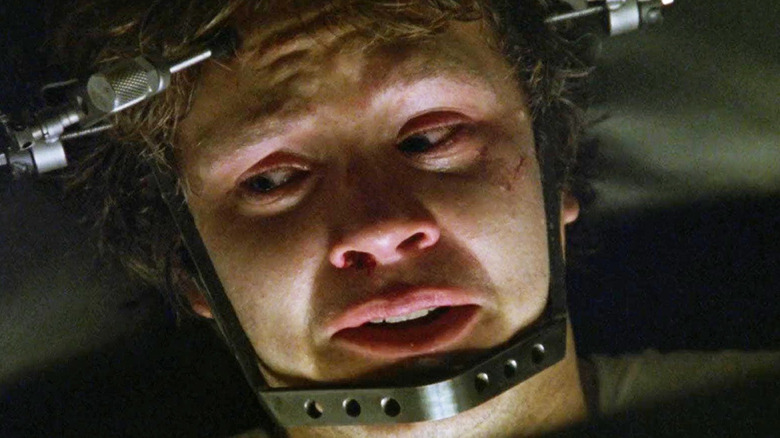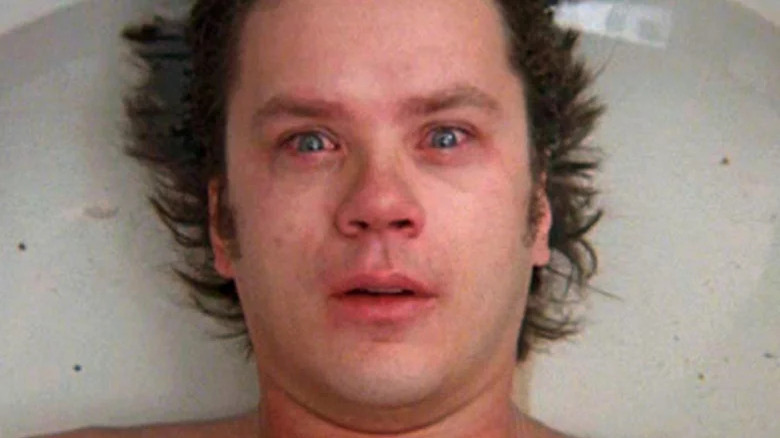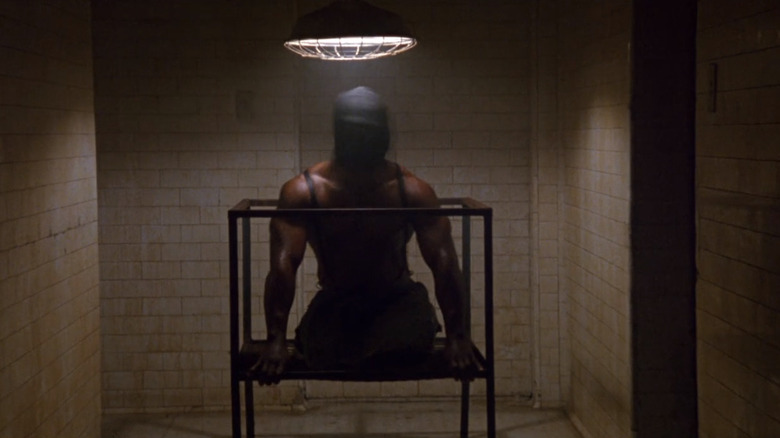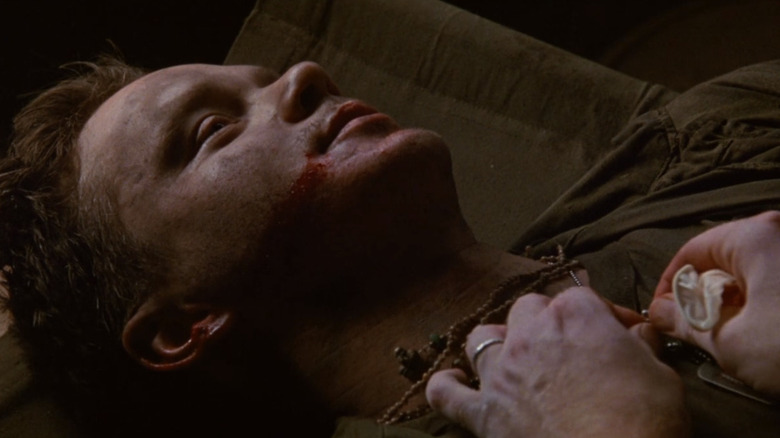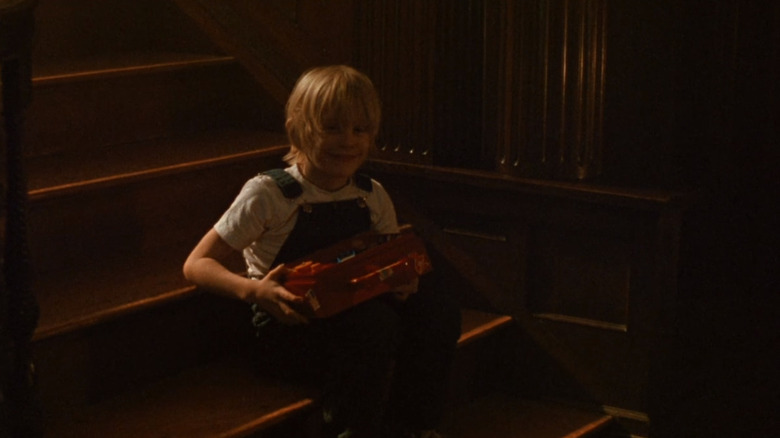The Ending Of Jacob's Ladder Explained
"Jacob's Ladder" is a film that wound up far more influential than it might have initially looked. Though a modest box office success upon its release in 1990, it failed to make much of an impact past opening weekend. Since then, however, the film's harrowing psychological plot, excellent performances, and terrifyingly surreal imagery have earned it a cult following. It is frequently cited as one of the best horror movies ever made, influencing subsequent horror properties from "The Sixth Sense" to the "Silent Hill" video games (via SyFy).
There is a lot going on in "Jacob's Ladder," as there tends to be in the best examples of horror filmmaking. Missing even the slightest detail can leave the viewer even more confused and disoriented than they're supposed to be. The film's ending can be particularly thorny in this regard. Luckily, there are those of us who have spent enough time freeze-framing and analyzing, poring over the concepts of theme and symbolism, that we can lend a helping hand. We're here to help.
Back to 'Nam
The film starts with our protagonist Jacob Singer (Tim Robbins) with his unit in Vietnam, during the war's height in 1971. Immediately we know that this is going to get very ugly very quickly. A horror movie in Vietnam? How could it not?
Sure enough, within minutes, Jake's unit is under attack. Like countless other film scenes that take place in during the American war in Vietnam, the attack is exceedingly gruesome. But it is made all the more terrifying and disorienting when, in the midst of the carnage several of his comrades go into catatonic states or having seizures. With the situation disastrously hopeless, Jacob panics and runs into the jungle, only to be run through with a bayonet.
We are then jolted into a new setting. Jake awakes on the New York City subway, where he briefly, perhaps still dreaming, sees a tentacle hide itself under a homeless person's blanket. Getting off the train, he finds the exit to the subway station unexpectedly gated and locked. Trying to exit by hopping the tracks to the opposite platform, he is almost run over by another train.
It was all just a dream
Jake is living in Brooklyn with his girlfriend Jezebel (Elizabeth Peña), who he calls Jezzie, and their dog, Chester. It is 1975, Jacob has survived the harrowing ambush and the war, and has earned a PhD. He doesn't use it, however. Instead, he works as a mail carrier for the Postal Service. We also learn that, before the war, Jake had another life, complete with a wife, Sarah (Patricia Kalember) and kids. His youngest son, Gabe (a pre-"Home Alone" Macaulay Culkin), died in an accident before the war. Affable and relatively well-adjusted as he may appear, he is still a very haunted man.
The haunting is, we come to see, quite literal. Yes, there are the flashbacks, increasingly hallucinatory. But they seem to be jumping the gap into real life too. Not long after the train, Jake is almost run over by a car. He also starts seeing what can only be described as demons, inhuman faces, their heads vibrating back and forth at an unnatural pace. When he goes to the hospital to talk to his old VA doctor about it all, he discovers that not only has the doctor died in a strange car explosion, but they have no record of a Jacob Singer ever being a patient there.
At a friend's party, after being told by a palm-reader acquaintance (S. Epatha Merkerson) that he's already dead, he watches as Jezzie dances with a grotesque tentacled monster, before going into a seizure. Jezzie rushes him home. The next morning she discovers that he has a dangerous temperature, and drops him in an agonizing ice bath.
So THAT was the dream
We then smash cut to Jake, waking up next to Sarah in an entirely different house. Jacob was, he tells Sarah, having a nightmare about living in their dingy Brooklyn apartment. He and Sarah are still together. Even Gabe comes in asking about a noise. "I'm not going anywhere," Jacob tells him.
He does, though. Jacob awakes (again) in his bathtub back in Brooklyn. He recovers, but more confused and disoriented than ever. But a call from an old army buddy Paul (Pruitt Taylor Vince) takes him even further down the rabbit hole. Paul is squirrelly and paranoid when they meet at a local bar, claiming that people are following him, and that he's seeing terrifying apparitions — the same ones Jake is plagued with. When Paul turns on his car's ignition to leave, it explodes.
At Paul's funeral, Jake meets up with the surviving members of his unit in Vietnam. As it turns out, all of them, save one, have been having the same terrifying visions. Realizing that something is very wrong, and that all of them may be in terrible danger, they decide to get a lawyer, Geary (Jason Alexander), to help them get answers from the Army. But after initially agreeing to take their case, he abruptly refuses. Jake discovers it is because the rest of his comrades have decided to back out. When he confronts Geary at the courthouse, he tells Jake that upon investigating, he found no record that he or his friends were ever in Vietnam. They were all discharged after war games in Thailand, on psychological grounds.
Back to 'Nam, again
Outside the courthouse, a bewildered and desperate Jake is suddenly abducted by two men and shoved into the back of a car, where they order him to keep his mouth shut before violently tossing him out. Rushed to the hospital — and following a particularly terrifying vision of being trapped in a violent psych ward where surgeons insist he's dead — Jake is visited by Sarah and his two living sons. He is also, unexpectedly, sprung from the ward by his chiropractor, Louie (Danny Aiello). While fixing up Jake's back, he tells him of something that the medieval German philosopher Meister Eckhart said — that demons only appear as demons if one is frightened of dying. Those at peace see them as angels.
At home, Jake gets a call from Michael Newman, a fellow Vietnam vet. As he tells Jake, he was part of a top-secret chemical weapons program aiming to synthesize a drug that would increase aggression in soldiers. Jake and the rest of his unit were unwitting test subjects. Hence the seizures and catatonia in battle. Hence the demonic hallucinations. Hence the erasure of Jake's history, and the threats from the Army itself. It's here that we discover that when Jake was stabbed in Vietnam, it was by someone from his unit. The drug's nickname? Ladder.
Climbing into a cab, Jake is taken home. Not his home in Brooklyn, but the well-appointed family home of Sarah and their kids. Nobody is home. Morning breaks, and Gabe appears to Jake, asking him to follow him upstairs. After a flash of white light, we see Jake's bloodied body on the Army operating table, where the medic says that though he fought like hell, he seemed peaceful when he finally passed.
So wait, it really WAS all a dream?
Quite often, the "it was all a dream" ending can feel like a cop-out, the kind of thing a middle English teacher would give a creative writing assignment a "C" for. It can also be profoundly annoying to audiences. Mostly because it reneges on all of the investment we've put into the characters, the plot, and the stakes. We end up feeling cheated, left with a whole heap of unresolved questions. Were the demons actually angels? And, either way, were they even real or were they simply part of a dream?
Perhaps this is why "Jacob's Ladder" only came to be regarded as a brilliant horror movie over time. It uses "it was all a dream" to subvert the trope, disorient the audience, and give us a deep dive into Jake's broken mind. This becomes clearer, and more rewarding, with subsequent watches. What matters isn't whether it's a dream. Indeed it is, which means that the distinction between real and supernatural are as permeable as they are meaningless. What matters is what Jake is coming to terms with via those dreams. When we dream, time is subjective. Days can happen in hours and vice versa. However long the mind needs to understand. Jake, a profoundly intelligent but tortured man, had a great amount of symbols, concepts, and damage to sort through ... and all the while, the creeping knowledge — via everyone from a palm-reader to an evil surgeon — that he is already dead. What took a matter of minutes on an Army operating table took four years inside his mind.
A peaceful death
Still, one question remains unanswered. Did the chemical experiments on Jake and his unit actually happen? If 90% of the film takes place in Jake's mind, then this would include Newman's revelations. Then again, the ambush during the film's opening, in which his fellow soldiers are clearly having mental breakdowns, takes place before Jake is stabbed, and therefore, presumably, before the beginning of his dream.
America's experimentation on its soldiers has been confirmed in recent decades, from Project MKUltra to the Edgewood Arsenal experiments. Edgewood is where BZ gas was developed, a compound that produces hallucinations and what has been described as "toxic delirium" (via NBC News). Director Adrian Lyne said that the movie was influenced by one of the quintessential books on the matter, "Acid Dreams: The CIA, LSD, and Sixties Rebellion" (via The Seattle Times), and "Jacob's Ladder" ends with a short note about the use of BZ, leading us to believe that Ladder is based on it. The chemical compounds allegedly given to Jake's unit, then, were plausible enough. If they were intended to specifically increase anger and aggression, however, then the torment and pain of the demons must have felt all too real. So too would the emotional resonance he had with biblical names (Jacob, Jezebel, Gabriel, and so on).
In some ways, and quite apart from whether he was in fact experimented on, the Army and the war were depriving Jake of something that should be everyone's right: a peaceful death. The biblical references, the words of Eckhart via Louie the guardian angel chiropractor ... these were what he had to work with to come to terms with his own death, as well as that of his son. It might have taken longer than it should have, but Jake got there.
